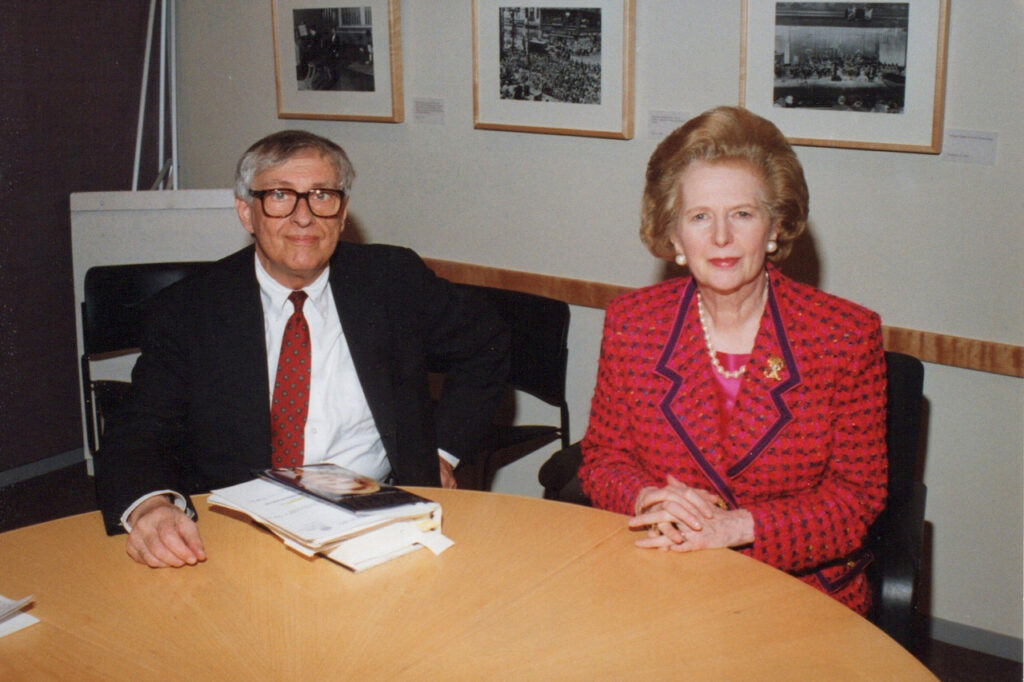One of the more remarkable figures in Chicago history, the late Milton J. Rosenberg, was born 100 years ago today, on April 15, 1925.
Born in New York, Milt, a social psychologist long on the faculty of The University of Chicago, went to Brooklyn College; earned his master’s degree at the University of Wisconsin; and the Ph.D. at the University of Michigan, where he began his teaching career. He also taught at Ohio State, Dartmouth, and Yale before coming to The University of Chicago where he settled into a lasting and productive academic career.
He contributed significantly to scholarship in his field, publishing several books on psychology, including Beyond Conflict and Containment and Attitude Organization and Change.
In addition to his full-time teaching and research work at the University, Milt for several decades hosted one of the more unusual and sophisticated talk shows on commercial radio, “Extension 720 with Milt Rosenberg”. Broadcast over WGN-Radio, a two-hour program every weeknight where Milt and his guests discussed everything from politics to literature to history to science and nearly everything else under the sun.
It had a high-brow flair, but it made money for WGN and its then-owner, The Tribune Company.
His in-studio guests over the years were a Who’s-Who of 20th and 21st Century newsmakers, scholars, athletes, artists, writers, and performers. Margaret Thatcher discussed foreign affairs; Martin Gilbert discussed history; Tony Mockus and actor colleagues performed, and analyzed, scenes from Shakespeare; former Chicago Bears President Mike McCaskey discussed practical uses for, and his love of, the Latin language; baseball players discussed the fine arts of pitching and hitting.
They also included Henry Kissinger, Clare Asquith, Betty Friedan, Bob Feller, Carl Sagan, Norman Mailer, P. J. O’Rourke, Samantha Power, Edmund Morris, George Will, Colin Powell, William Safire, Bill Murray, Stanley Kurtz, Charlton Heston, and countless others.
At the end of each year he would organize a show on the best non-fiction books of the year; another on the best fiction books of the year; and yet another on the best foreign-language books of the year that had been translated into, and published in, English. The reviews offered by his guests were always insightful, often hilarious, and invariably packed with information about authors, literary history, writing styles, and the people and events — real and fictional — depicted in the books.

In the last decade or so of his program, Milt assembled a panel he called his “A Team” which he called in a few times each month to assay the current state of national and global affairs. The “A Team” consisted of Charles Lipson, a professor of political science at The University of Chicago; Christopher Robling, a former news radio anchorman and former Chicago elections commissioner; Scott Stantis, a syndicated cartoonist and long the chief editorial cartoonist of the Chicago Tribune; and your humble servant.
Milt’s typical on-air slot ran from 9:00 p.m. to 11:00 p.m. each weeknight, which meant that he frequently followed WGN’s broadcasts of Chicago Cubs baseball games and Chicago Blackhawks hockey games. Sports fans who left their radios on after games ended were often introduced to Milt, a polyglot and polymath, and his extraordinary world of ideas, imagination, and endless information — and thus introduced, they often stayed.
Michael Kilian of the Chicago Tribune once described Milt as “excruciatingly erudite yet engaging”, able to “leap from ward politics to nuclear warhead throw-weights to Etruscan philosophy in a single bound, and then do a commercial for Vienna Red Hots.”
He was also capable of criticizing his own advertisers on the air. A loyal advertiser was a retail Chicago-area jewelry shop called “The Jewelry Exchange” which ran a recorded spot most nights on “Extension 720”. The announcer (not Milt) who had recorded the commercial for the sponsor pronounced the word “jewelry” in a sloppy way that Milt heard, not as “jewelry” but as “Jewry”. Hearing nightly references to “The ‘Jewry’ Exchange” really annoyed him. Finally, one night he couldn’t contain himself any more and he asked, out loud and on the air, “What are they exchanging out there? Jews?” The advertiser fortunately enjoyed the crack and neither dropped his sponsorship of Milt nor had the spot re-recorded.
His extraordinary career as both scholar and broadcaster won him much recognition, including bestowal at a White House ceremony in 2008 of the National Humanities Medal.
He died in Chicago in early 2018, a few months shy of his 93d birthday.
Milt is survived by his son, Matthew Rosenberg, an independent scholar in the social sciences and journalist who divides his time between Chicago and the Pacific Northwest. Matt is the author of, among other works, What Next, Chicago?: Notes of a Pissed-Off Native Son (New York and Nashville: Post Hill Press, 2021).
Perhaps the most remarkable thing about Milt was his self-described “intellectual journey” that played out in public over his decades on radio. He would say that he — once the author of Vietnam and the Silent Majority: The Dove’s Guide — started out, both as an academic and as a broadcaster, as a “typical New York Jewish left-wing liberal” — but that life “educated” him. Beginning in the 1980s, and accelerating in the years of the Clinton Presidency, he “transitioned” from left to right, becoming, he said, a “principled conservative” in economics, social perspectives, and foreign policy.
He was brilliant; well-informed; fluent of speech and pen; and both demanding of, and kind to, his students and radio listeners alike.
In the classroom and on the air, Milt Rosenberg’s mind and voice are very much missed today.

















